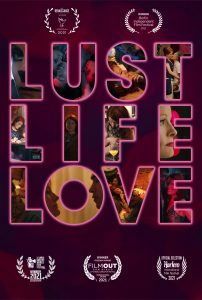We interviewed Sellars about the personal meaning beyond the film, her storytelling choices, and the representation of polyamory in entertainment.
What was the inspiration for the film and how did it evolve over the five years you were writing it? Were there any specific experiences of yours that inspired you to want to portray them on film?
The film was inspired by my personal experience with sexual exploration and polyamory. Specifically I was focused on a period of my life when I was in love with someone who was new to sexual exploration and polyamory and whose enthusiasm presented an unexpected threat to my attachment to this person and my sense of self… the film is not a celebratory polyamorous awakening story, but more of a questioning of all relationship forms. It is my truth and a truth I think many people can relate to… when relationships get hard, it comes down to personal desire and boundaries more than trying to fit into a prescribed relationship, whether monogamous or not, straight or queer. The script went through many changes, but this arc remained pretty intact. It took a while to get the ending right though, whether or not Veronica and Daniel stay together and how Veronica feels at the end. Some other changes involved the antagonist Maya, who started out as two separate characters, then once she became a single character, there were drafts where she was more manipulative and villainous. Another change is that in early drafts Veronica was a sex columnist for an alt-weekly newspaper and there was more plot around that. I made her a blogger instead as the era of sex columns and alt-weeklies pretty much disappeared. The story needed to adapt to the current times.
What was it like to play a version of yourself, especially exploring sexuality in so many different ways with so many different characters?
It felt pretty natural because the character was so close to me. At the same time, I made sure to keep some distance between me and the character, so I would not feel limited in the writing and acting, beholden to what actually happened. I didn’t want to be like, oh I never did that or I would never do that; it was more important to serve the story. That’s the fun in playing a version of yourself– getting to do things you might never actually do in real life! The sex scenes were not unlike playing with people at a party or on a date… the only difference was we were simulating sex and there was a camera and a sound boom. There was nothing I did sexually on screen that I hadn’t done in life. In lieu of having an intimacy coordinator coaching the sex scenes, I sat down with each actor and had a conversation about their personal boundaries regarding what they were okay with and not okay with doing on camera. Then my co-director, DP and I discussed how we wanted the scenes to progress in order to move the story forward. With those parameters set, the scenes flowed organically.
In some ways, Lust Life Love is an introduction to polyamory, both for some of the characters and for viewers. How did you approach explaining polyamory and terms like compersion to an audience who might not know about it?
We knew the best way to accomplish this without being pedantic was to have a character who is new to polyamory (Daniel) so that those terms and explanations would come up naturally in the course of his relationship with Veronica who is his guide in this new world. I was super aware of the danger of being too pedantic, so whenever that possibility came up in the writing or editing, we looked at those moments carefully and cut anything that smelled of Polyamory Workshop 101.
One thing I thought was really interesting was how much the sex parties played a role in Veronica’s relationships, both in terms of where she meets people and how her polyamory plays out, vs. what they’re doing in a more private arena. How would you say the polyamory community plays a role in her life? Is this something you think is common?
Sex parties are a bit of a spectacle–there’s often a theme and people wear costumes. They are about pleasure, exhibitionism and voyeurism more than intimacy and connection. The parties are where Veronica can be free but she is also guarded, playing a role. Throughout the course of the narrative, she finds it harder and harder to maintain this role. When the private becomes public, it usually doesn’t go well. In my experience in New York City, there is a strong overlap between the poly community and sex parties. Connection can happen anywhere for open-minded people. But I also think community can fall short when someone is struggling in a way that seems to go against everything the community stands for. At that point, is community really going to be there for you? Of course, there are poly people who don’t engage in group sex and people who go to sex parties who don’t have polyamorous relationships, but I wanted to make a movie about what I know best.
While Veronica is very committed to polyamory and writes about it frequently, exploring her own experiences, she also grapples with jealousy. Can you talk about that aspect of her relationship with Daniel and what that signifies for her, because earlier she had said the cycle of seeing her lover pleased makes her pleased, but she struggles to deal with her own jealousy when it comes up.
Before Daniel, Veronica doesn’t experience much jealousy because her partners are either not interested in dating others or their other partners are too invisible to be a threat. She feels immune to jealousy because she has a lot of control in her relationships. With Daniel, she has met her match in poly appetite, but it feels like an assault because his desires are beyond her control. He is the perfect catalyst to show her that she is less secure in relationships than she thought. This is why her earlier feelings of compersion turn sour. Sometimes compersion and jealousy can co-exist because relationships are complicated. One doesn’t necessarily negate the other.
The characters don’t always behave perfectly or according to the rules they’ve agreed to about polyamory and BDSM. Why was it important to you to include those instances along with the happier ones?
Without those moments of rule-breaking and bad behavior, there would be no drama or conflict, and without those elements, it would be a snapshot, not a movie. Who wants to watch a movie where everything is great all the time? Even happy ending romantic comedies have conflict and moments where the audience wonders, is this actually going to work? So, it was important to me from a story-telling perspective, but I also wanted to present an authentic, realistic story about polyamory, not a sugarcoated fantasy. The reality is it’s not always happy. The truth is people behave badly even if they have good intentions. People get hurt no matter how lofty and ethical you try to be in relationships.
There’s a very interesting scene where Veronica and Daniel come out as poly to her parents. Can you talk about the inspiration for that scene? Do you have any advice for people who are coming out as polyamorous to their family?
I never formally came out as poly to my family at a dinner with a new partner. That is complete fiction. But I do come from privilege and my family is conservative and I was not well-received when I came out as bisexual years before I made this film. I thought it would be interesting for the audience to see where Veronica comes from, so that her character would make more sense. She’s not really seen in her family. She has had partners who are not white and not straight. How her family reacts to Daniel says a lot about why she is the way she is. I’m not sure how to advise people coming out as poly to their family. Ask yourself why they need to know. Go slowly. A letter or email might be easier than making an unexpected announcement. Expect to be disappointed, and you might be surprised.
Benjamin said on the Film Threat podcast that the film was originally titled Lust Life and became Lust Life Love, which intrigued me. What role does love play in polyamory for Veronica?
The original title came from the sex column I wrote for New York Press. When we were working on the marketing materials for the film, one of the producers suggested a title change because “Lust Life” implies a story primarily about sex. It’s misleading because the film is more about love and relationships and sex just happens to be a significant part of that. In the beginning of the film, Veronica says, “If I can find a little bit of the one in each person I fall for, and they see a little bit of the one in me, what could be more romantic than that?” Amidst all her lusting, she’s a true romantic at heart.
What do you hope viewers take away from the film?
For those unacquainted with polyamory, group sex and kink, I hope that they will be inspired to explore if they are curious. For those viewers already familiar with the world in which Veronica lives, I hope some aspect of their beliefs about relationships are validated by the film or even challenged. I also want viewers to take a lot of pleasure in the variety of sexual and gender expressions depicted in the film. More than anything, I want viewers to understand that there is no one right way to have a relationship. All relationships are hard, and the hardest is often the relationship with yourself.
How do you think portrayals of polyamory in mainstream culture have evolved over the last decade and what aspects of polyamory do you think are still underrepresented?
It’s definitely become more normalized, but it’s still usually portrayed as a cis-male-cis-female couple opening up their relationship. Or a highly sexualized person being selfish. Even the term polyamory is evaded. I recently saw a film on Netflix where a character told his lover he had a wife (after they had sex) and several other women he had children with, which he described as “very European”… it was a silly comedy, but still, why can’t it be named for what it is? We also don’t see single polyamorous people or queer poly people (aside from bisexual women) or non-binary or trans poly configurations. It’s being written about in articles but not portrayed in film or TV so much.
On a personal note, what do you wish you’d known about polyamory before you got involved with it?
I wish I had more compassion for myself, which has less to do with polyamory and more about relationships in general. I learned a lot through my experiences and I’m glad I didn’t know too much going in, or I might not have embraced it as fully as I did.
What’s next for you?
I decided to get an MFA in creative non-fiction. In the past two years, I’ve written a lot of personal essays that I’m looking to get published. At some point I’ll make another film, but it won’t be as close to my life, and I won’t be starring in it. Whatever I create, one thing is consistent: I will continue to explore some of the most difficult subjects: sex, money, and love!


